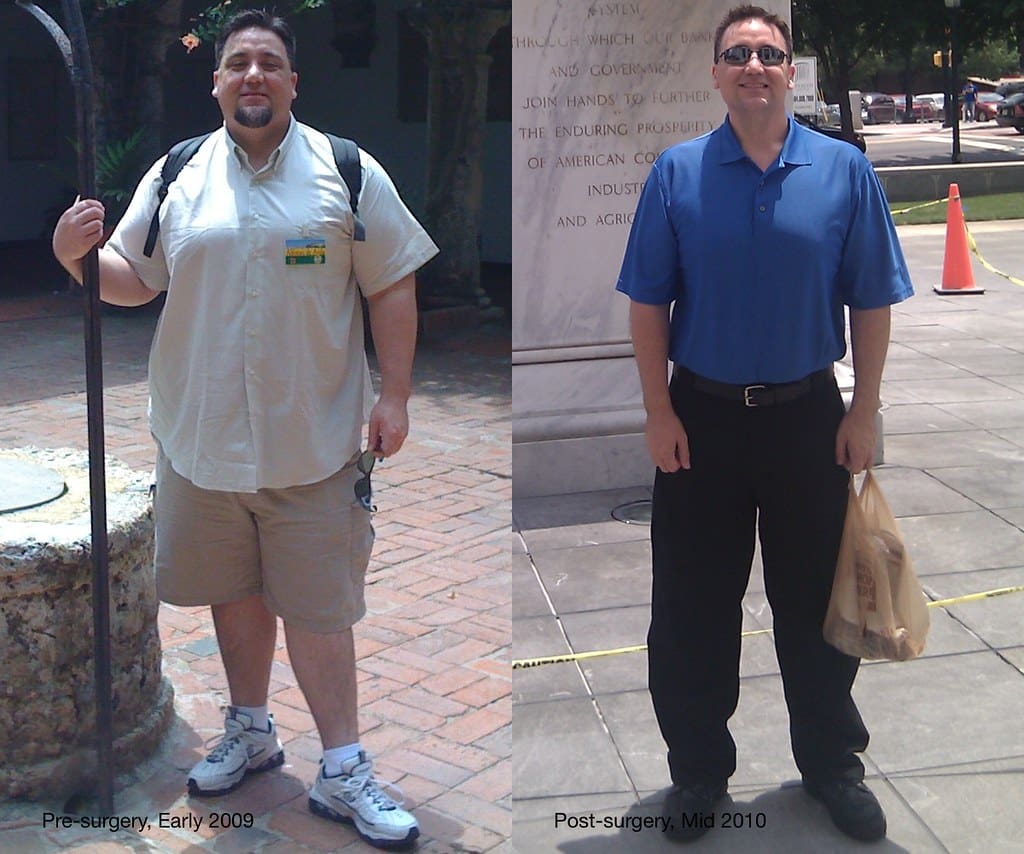Results of gastric bypass surgery before and after, this is a interesting knowledge. Health complications such as cardiovascular disease, stroke, type 2 diabetes, and even cancer are possible outcomes of obesity, a serious medical condition in and of itself.
Biopsy, known as gastric bypass, can aid obese patients in losing weight and improving their health. Before and after gastric bariatric biopsy, this article will go over the pros and cons of the procedure, including who is a good candidate and what to expect from the process.
Contents
- 1 How gastric bypass surgery works
- 2 Benefits of gastric bypass surgery before the procedure
- 3 Benefits of gastric bypass surgery after the procedure
- 4 Risks of gastric bypass surgery
- 5 Who is a good candidate for gastric bypass surgery?
- 6 Conclusion: The Benefits of a gastric bypass surgery before and after
How gastric bypass surgery works
People who suffer from obesity may find relief and better health after undergoing a gastric bypass biopsy. The stomach pouch allows food to be redirected, reducing calorie absorption and allowing for restricted meal consumption. Although gastric bariatric biopsy is a big undertaking, it has a high success rate in assisting patients in losing weight and keeping it off.
To avoid traveling through most of the stomach and the initial portion of the small intestine, the surgeon makes a tiny pouch in the abdomen and attaches it straight to the small intestine during the operation. By rerouting meals, it becomes easier to control calorie and nutrient intake.
Another benefit of gastric bariatric biopsy is the hormonal shifts that accompany it, which make you feel full on fewer calories. Patients with gastric bariatric biopsy usually become much healthier and lighter after the procedure.
Due to the complexity of the operation, gastric bariatric biopsy is not without its risks. Gastric bariatric biopsy, on the other hand, can have profound positive effects and change the lives of those who suffer from obesity.
Benefits of gastric bypass surgery before the procedure
People who are battling obesity and its complications can reap several benefits from gastric bariatric biopsy. Patients can significantly enhance their health and quality of life before the biopsy.
Significant weight loss is a crucial outcome of gastric bariatric biopsy. Patients experience rapid and effective weight loss due to the procedure’s impact on calorie restriction and absorption. Because this can lead to more energy, improved mobility, and reduced joint strain, overall physical function can be improved, and the risk of obesity-related disorders can be decreased.
Those who have type 2 diabetes may find significant relief after undergoing a gastric bariatric biopsy. In some instances, the operation leads to better blood sugar control and the disappearance of the disease. Fewer medications are required after the procedure because metabolic health is improved and insulin levels are better controlled.
Reduced risk of cardiovascular disease, stroke, and other cardiovascular complications is another advantage of gastric bariatric biopsy. The biopsy improves cardiovascular function and lowers blood pressure and cholesterol levels by promoting weight loss and better blood sugar control. This significantly reduces the risk of cardiovascular disease, stroke, and other potentially deadly events.
Additionally, gastric bariatric biopsy lessens joint pain and improves joint function. Obesity often manifests as aches and stiffness in the joints. Patients experience less joint discomfort after gastric bariatric biopsy since the procedure aids weight loss, which increases mobility. That frees people up to do more and live life to the utmost.
Gastric bariatric biopsy has many incredible benefits, including better mental health. Being overweight is associated with a host of mental health problems, such as anxiety and sadness. With gastric bariatric biopsy, you can lose weight and improve your overall health, which has a multiplicative effect on your mental health. This includes your self-esteem, confidence, and quality of life.
Benefits of gastric bypass surgery after the procedure
Following gastric bariatric biopsy, a person’s health and wellness might improve in many ways. One of the most significant benefits is the rapid reduction of body fat. When people combine the procedure’s restrictive nature with adjustments to their food and way of life, they can achieve significant weight loss and return to a healthy weight range. Their lives can be changed drastically if their mobility, vitality, and self-esteem are improved.
Gastric bariatric biopsy not only helps with weight loss but also significantly improves problems associated with obesity. After the operation, many patients report significant improvements in their hypertension, cholesterol, and glucose levels. Serious health problems, including cardiovascular disease, stroke, and type 2 diabetes, are far less likely to occur with such a significant reduction in risk factors.
Upset stomach bariatric biopsy has many health benefits, including decreased cancer risk, improved joint function, and pain relief.
Patients generally report a marked improvement in their health and wellbeing following an upset stomach bariatric biopsy. They might feel more energized, sleep better, and have more energy overall. A higher quality of life, more fulfillment in one’s work and play, and more pleasure in one’s everyday activities are all possible outcomes of this revitalization.
Enhanced confidence and positive perceptions of one’s body are additional anticipated results of upset stomach bariatric biopsy. Patients typically feel better about their future once they lose weight and get back in charge of their health. Confidence, better social connections, and a higher opinion of oneself are all possible outcomes of this constructive change. These psychological changes improve an individual’s general health and happiness.
Finally, there are numerous ways in which a person’s life can improve after upset stomach bariatric surgery. The technique can revolutionize the lives of individuals battling obesity and its related health issues, leading to significant weight loss, decreased health risks, increased energy, and improved self-esteem.
Risks of gastric bypass surgery
There are inherent dangers in undergoing indigestion bariatric surgery because it is a substantial medical operation. It is crucial to be aware of the hazards associated with the procedure before opting to have it done, even though most patients have good results.
Leakage at the staple line, which connects the small intestine to the stomach, is one of the most severe concerns associated with indigestion bypass surgery. Infection, sepsis, or perhaps death can result from this. Additionally, there is a risk of disease, hernias, nutritional deficiencies, and blood clots in the feet or lungs.
Evidence abounds that indigestion bypass surgery endangers not just the physical but also the psychological and emotional well-being wellbeing of patients. Mental health issues, including anxiety, depression, or both, might develop in some people after surgery. They know the risks and what to do if you have any symptoms, which is crucial to remember.
A safe and successful indigestion bypass procedure can help obese patients lose weight and improve their health. It is essential to know the risks of surgery before deciding to have it done.
Who is a good candidate for gastric bypass surgery?
Due to the risks and advantages, some patients must be better candidates for indigestion bypass surgery. Indigestion bypass surgery is the ideal choice for some patients. The heart of the matter is that.
It would help if you met a few criteria before they’ll even consider you for indigestion bypass surgery. Some of the necessary prerequisites are as follows:
To be eligible for bariatric surgery and lose weight, you must fulfill the following requirements: The following prerequisites must all be satisfied: The following conditions must all be met: You must be eighteen years of age or older. If your BMI is not forty pounds or greater, you cannot participate. You have undoubtedly made numerous unsuccessful attempts to lose weight by changing your diet and boosting your physical activity.
You should generally be in excellent health. There shouldn’t be any significant health conditions that could affect the surgery. – Following your therapy, maintain a balanced diet and increase your activity.
Getting yourself mentally and psychologically ready for indigestion bypass surgery is just as important as fulfilling the other conditions. It’s crucial to educate oneself about surgery before having it done, including learning about the benefits and hazards of the treatment and any prospective changes to one’s lifestyle.
Before deciding to have upset stomach bypass surgery, speak with your doctor. It can be helpful to discuss the benefits and drawbacks with your doctor.
Conclusion: The Benefits of a gastric bypass surgery before and after
This article will discuss the benefits of upset stomach bypass surgery before and after the treatment. Patients have much-improved health after upset stomach bypass biopsy when they drop a significant amount of weight. To name just a few obesity-related health issues, it can either worsen or alleviate type 2 diabetes, cardiovascular disease, and sleep apnea.
Upset stomach bariatric biopsy gery improves a person’s physical, emotional, and subjective well-being wellbeing. Many patients report that the positive effects of the operation, including improved health and substantial weight loss, continue long after the procedure has ended.
You should carefully evaluate the dangers and benefits of an upset stomach bariatric biopsy and ensure that you fulfill the requirements for the operation before deciding to go through with it. If that’s true, upset stomach bariatric biopsy can revolutionize weight loss and overall health.










